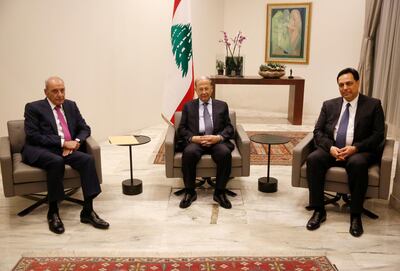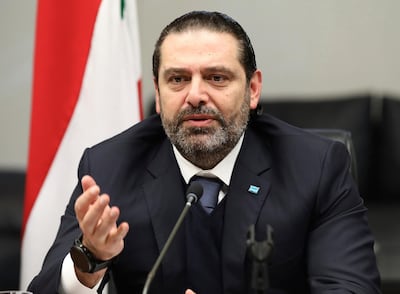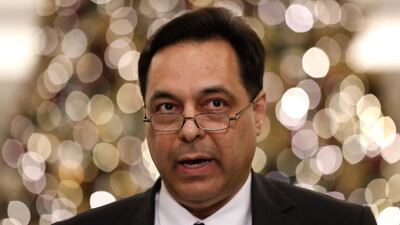Lebanese academic Hassan Diab, a former minister backed by Hezbollah, accepted the position of prime minister designate on Thursday after President Michel Aoun charged him with forming a new government.
The announcement came more than seven weeks after Prime Minister Saad Hariri resigned because of nation-wide, anti-government protests that have not stopped.
Mr Diab, 60, a little-known professor of electrical engineering at the American University of Beirut, replaces Mr Hariri amid the worst economic crisis since Lebanon's 1975-1990 civil war.
The former education minister received 69 votes from Lebanese MPs who met Mr Aoun to tell him of their choice on Monday.
Speaking from the presidential palace in Baabda outside Beirut, Mr Diab said he requested that consultations with parties would begin on Saturday to start forming a government, the state-run National News Agency reported.
He is expected to meet with different factions to agree on the composition of the new Cabinet, which he will submit to the president. This process usually takes several months in Lebanon.

Lebanon has been rocked since October 17 by nationwide anti-government protests, which pushed Mr Hariri to resign on October 29, collapsing the government.
Protesters demand a government of technocrats with no links to politics to save the country from economic collapse.
Mr Diab said he was “a specialist and the priority is for specialists", but did not clarify whether his government would include politicians.
He received the backing of parties that made up the largely defunct March 8 movement, including Hezbollah, the Amal Movement and Mr Aoun’s Free Patriotic Movement.
They have called for an administration of technocrats and politicians, despite the demands of protesters.
Thirteen MPs from parties considered to be more aligned with western countries, such as the Progressive Socialist Party, nominated International Court of Justice judge Nawaf Salam for prime minister.

Forty-two MPs did not offer any name. Among them were three former prime ministers, including Najib Mikati, who led the government when Mr Diab was Education Minister in 2011.
Mr Hariri’s Future Movement, the main representative of Lebanon’s Sunni Muslim community, also did not put forward a nomination.
Under the country’s constitutional power-sharing system, the prime minister must always be a Sunni.
The Future Movement’s lack of support for Mr Diab puts him in a difficult position.
In the past, presidents have been reluctant to select a candidate who does not have the backing of the Sunni community.
“This is a big problem because a major component of Lebanese society is not part of the deal,” said Sami Nader, director of the Levant Institute for Strategic Affairs.
Mr Hariri's party said "from the beginning" that it would not be part of the next government, Moustapha Allouche, a member of the Future Movement, told The National.
Mr Allouche said the 2011 administration of Najib Mikati showed that the new head of government did not need Sunni backing.
“What is important now is to form a government that will be judged not on its sectarian content but on its real political and technical content,” he said.
Support from Hezbollah and its allies could complicate Mr Diab’s requests for international financial, which is widely expected to resolve the crisis.
“This kind of government will isolate Lebanon completely and deepen the economic crisis,” Mr Nader said.
Mr Hariri again ruled himself out for the post on Wednesday evening, after a week of tense protests and clashes in Beirut as the two-month mass protest movement against the government continued.
He joined the call for an administration of technocrats to work on a mandate of fixing the economic crisis, resolving long-running infrastructure issues and weeding out corruption.

